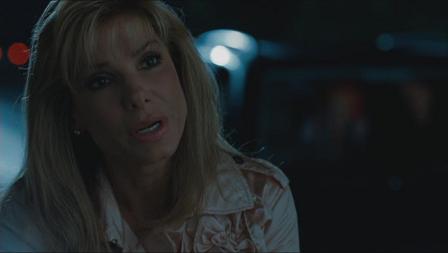Paolo here.
Back in 2009 I stumbled into what looked like Bullock's CAA page, and seeing a certain factoid, I posted this question on my Facebook. "What do Stanley Kubrick and Sandra Bullock have in common?" "Well neither of them have an Oscar," a friend of mine said. He spoke too soon. [Correction: Kubrick has an Oscar but not for directing. Shake fist]
Then it was time to watch the live feed of the Oscars on campus. The fedora-wearing cinema studies students were passing around this hipster German beer and I took a sip and put it down. I swore that if Bullock won the Oscar, I'd throw my beer at the screen - I didn't, no one should. The sound of angry young men and some women collectively screaming against her victory is one of the ten greatest experiences I've ever had in a movie theatre. How the powers that be hustled such a seemingly mediocre film into a Best Picture nod and a Best Actress win was like watching steel beams bend by themselves.
Anyway, to commemorate Bullock's birthday, I watched neither the movies that I remember her being good at (A Time to Kill, Crash) nor the ones I saw in high school nor college that did not age well (28 Days) or even the fun ones (Practical Magic). Instead I saw John Lee Hancock's The Blind Side, the movie that won her the said Oscar and made her, on paper, better than Kubrick. To be honest, I had two tall glasses of beer, ruining some brain cells and I was afraid that this film would do more damage.

We can assign three intertwining 'themes' to this movie. The first is when Leigh Ann Tuohy (Bullock) and her family take Michael 'Big Mike' Oher (Quinton Aaron) in and the audience also gets introduced to the rich racists, the poor racists of both colours and the racism within the Tuohys. The film begins with Leigh talking about a left tackle's body parts and we can make comparisons there. And someone should tell the woman that it's Fay Wray, not Jessica Lange! The second is when Michael's teachers and his investigator tries to bring him down and he says something unconvincing but does the trick anyway. If I was the lit prof reading his essay on "The Charge of the Light Brigade," I'd still give him a D. Lastly, there's both Leigh and Michael making mistakes and hurting each other but not so that it will ruin the chances of their eventual reconciliation.
I actually like the Tuohy family dynamic, even if her daughter Collins' (Lily Collins) role in the film is just to be pretty. Or how Leigh and Michael's worst fight happens ten or fifteen minutes before the end so that both don't spend time mooning in front of the camera while some hackneyed score tries to convince us how much they regret the event. In between moments of me yelling at my laptop while these characters speak without listening to themselves, it surprised me how competently paced this movie is.

And of course, there's both good and bad in Bullock's performance as Leigh, a rich woman with a cheap watch, wig and accent. Leigh spends most of the film assessing others and knowing how to properly deal with them. I do concede that I like her during her first conversation with Michael, looking at this intimidating figure square in the face. There we know that she'll be fine and that they'll get along famously. And of course, I can't hate on a 'walking to the car to cry by herself where everyone can still see her and she can get consoled' scene.
I guess I didn't care whether she won or not. A few actresses deserving the nominations didn't get them anyway.